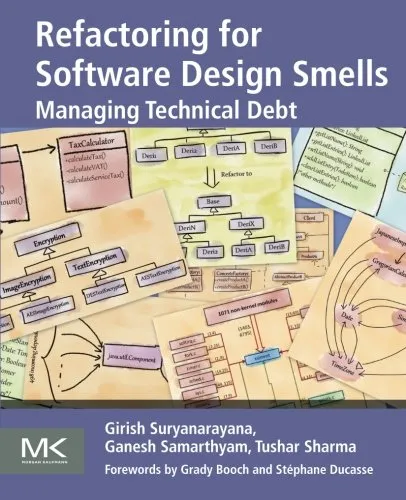Refactoring for Software Design Smells: Managing Technical Debt
4.5
بر اساس نظر کاربران

شما میتونید سوالاتتون در باره کتاب رو از هوش مصنوعیش بعد از ورود بپرسید
هر دانلود یا پرسش از هوش مصنوعی 2 امتیاز لازم دارد، برای بدست آوردن امتیاز رایگان، به صفحه ی راهنمای امتیازات سر بزنید و یک سری کار ارزشمند انجام بدینمعرفی کتاب: Refactoring for Software Design Smells: Managing Technical Debt
کتاب "Refactoring for Software Design Smells: Managing Technical Debt" نوشتهی Girish Suryanarayana, Ganesh Samarthyam, Tushar Sharma، راهنمایی جامع برای بهبود طراحی نرمافزار و مدیریت بدهیهای فنی ارائه میدهد. این کتاب به مهندسان نرمافزار و توسعهدهندگان کمک میکند که با الگوهای مخرب طراحی، معروف به Design Smells، مقابله و آنها را اصلاح کنند.
خلاصهای از کتاب
این کتاب به بررسی مشکلات رایج طراحی در نرمافزار و ارائه راهحلهایی برای کاهش این مشکلات میپردازد. با تمرکز بر Refactoring، نویسندگان تاکید میکنند که با شناسایی و اصلاح Design Smells، میتوان قابلیت نگهداری و توسعهی نرمافزار را بهبود بخشید. این کتاب به پنج بخش اصلی تقسیم شده که هر یک پیرامون موضوعاتی نظیر شناسایی Smells، تکنیکهای Refactoring، و استراتژیهای مدیریت Technical Debt میپردازد.
نکات کلیدی
- روشهای تشخیص Design Smells و اهمیت اولویتبندی آنها.
- معرفی تکنیکهای Refactoring که به طور خاص برای Design Smells طراحی شدهاند.
- نحوه مدیریت بدهی فنی برای بهبود طولانی مدت پروژههای نرمافزاری.
- استفاده از ابزارها و تکنولوژیهای مدرن برای پشتیبانی از فرآیند Refactoring.
- مطالعات موردی که نشان میدهند چگونه تیمهای نرمافزاری موفق به بهبود کیفیت نرمافزار خود شدهاند.
نقل قولهای معروف از کتاب
"هرچه زودتر Design Smells را شناسایی و اصلاح کنید، هزینه و دردسر کمتری در آینده خواهید داشت."
"بدهی فنی نه تنها هزینههای نگهداری را بالا میبرد، بلکه بهرهوری تیمهای توسعه را نیز کاهش میدهد."
چرا این کتاب مهم است
با افزایش پیچیدگی نرمافزارها و حجم کدهایی که روزانه نوشته میشود، نیاز به نگهداری و بهبود کیفیت نرمافزارها امری حیاتی است. این کتاب با ارائهی استراتژیهای عملی و مثمرثمر برای شناسایی و اصلاح Design Smells، نقش مهمی در افزایش کارایی تیمهای نرمافزاری و کاهش بدهی فنی ایفا میکند. مطالعهی این کتاب به توسعهدهندگان کمک میکند تا با رویکردی ساختارمند و سیستماتیک، بهرهوری و کیفیت پروژههای نرمافزاری خود را بهبود بخشند.
Introduction to "Refactoring for Software Design Smells: Managing Technical Debt"
Welcome to an in-depth exploration of "Refactoring for Software Design Smells: Managing Technical Debt," a book authored by Girish Suryanarayana, Ganesh Samarthyam, and Tushar Sharma. Our book aims to provide software developers and engineers with practical approaches to effectively managing technical debt by identifying, analyzing, and refactoring design smells. This guide serves as an essential resource for those who are determined to maintain the quality and sustainability of their software systems.
Detailed Summary of the Book
The book delves into the concept of design smells—symptoms of poor design that indicate deeper problems in the codebase—and presents proven techniques to refactor these issues. Broken into six comprehensive chapters, the content walks you through identifying design smells, understanding their causes, and determining the best strategies for refactoring. Throughout the book, we provide real-world examples and case studies that illustrate the process of mitigating technical debt effectively.
A distinctive feature of the book is its emphasis on design patterns and anti-patterns, providing guidance on how to differentiate between them. By focusing on design smells, we shed light on their impact on software sustainability and long-term project success. Additionally, we provide insights into aligning refactoring efforts with business goals and strategies, ensuring that technical debt is managed in a way that aligns with organizational objectives.
Key Takeaways
- Identification and Prioritization: Learn how to identify different types of design smells and prioritize them based on their impact on the software project.
- Refactoring Techniques: Gain access to a range of refactoring techniques tailored to resolve various design smells effectively.
- Impact of Technical Debt: Understand how unchecked technical debt can affect a project's success, leading to increased maintenance costs and decreased system agility.
- Integration with Business Strategies: Explore methods to align technical debt management with the overarching business goals, ensuring technical decisions support long-term strategies.
Famous Quotes from the Book
"Technical debt is not merely a technical issue; it's a symptom of how well an organization balances its immediate goals with the need for sustainable progress."
"Design smells signal a need for immediate attention, but they also present an opportunity to improve, innovate, and align with future objectives."
Why This Book Matters
In an era where software systems are integral to business operations, managing the hidden costs of software degradation has become paramount. This book is pivotal for software professionals who are keen on mastering the art of maintaining high-quality code. "Refactoring for Software Design Smells: Managing Technical Debt" equips readers with not just theoretical knowledge, but actionable insights that can be applied in real-world scenarios.
The relevance of this book extends beyond technical roles; it is a vital resource for project managers and stakeholders who need a clear understanding of the implications of technical debt. By framing technical debt within the context of business strategy and technical excellence, the book ensures that organizations can strike a balance between innovation and maintaining robust, agile systems.
دانلود رایگان مستقیم
You Can Download this book after Login
دسترسی به کتابها از طریق پلتفرمهای قانونی و کتابخانههای عمومی نه تنها از حقوق نویسندگان و ناشران حمایت میکند، بلکه به پایداری فرهنگ کتابخوانی نیز کمک میرساند. پیش از دانلود، لحظهای به بررسی این گزینهها فکر کنید.
این کتاب رو در پلتفرم های دیگه ببینید
WorldCat به شما کمک میکنه تا کتاب ها رو در کتابخانه های سراسر دنیا پیدا کنید
امتیازها، نظرات تخصصی و صحبت ها درباره کتاب را در Goodreads ببینید
کتابهای کمیاب یا دست دوم را در AbeBooks پیدا کنید و بخرید


